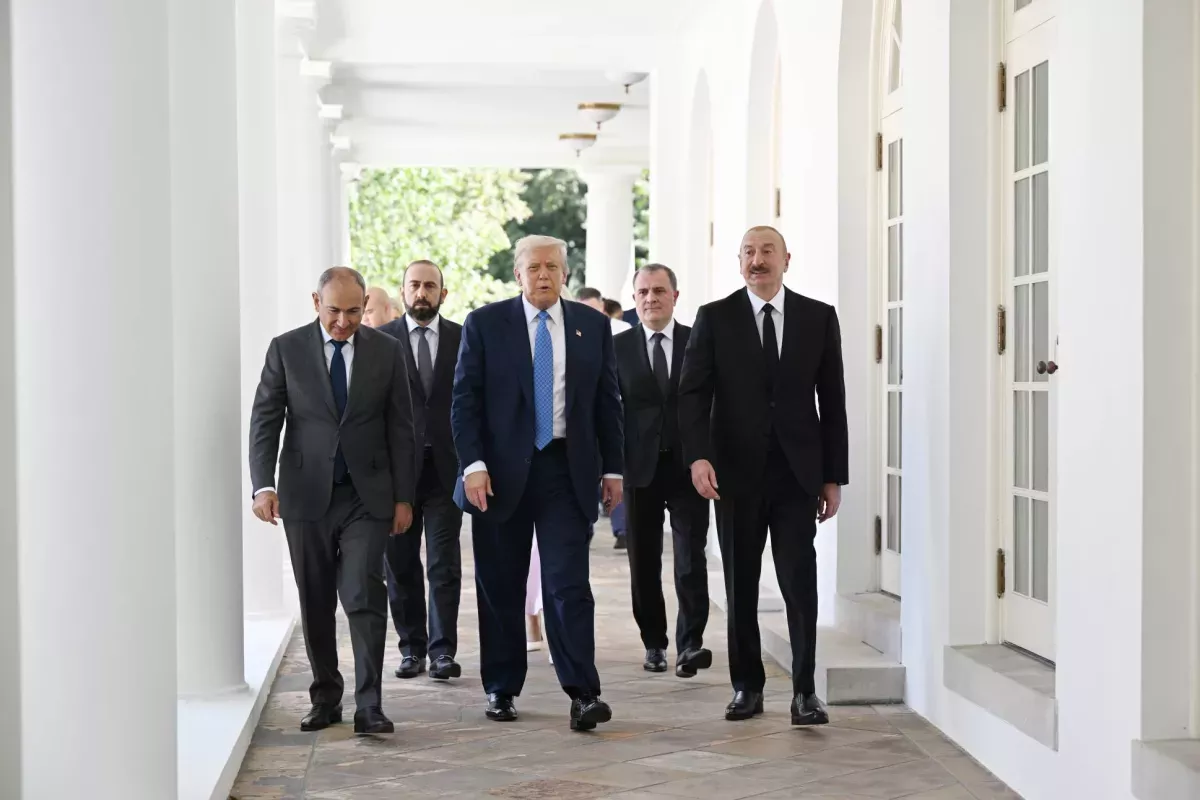Aliyev’s Washington message: No compromise on Azerbaijan’s core interests Armenian Constitution as an Obstacle to Peace
The working visit of Azerbaijani President Ilham Aliyev to the United States was marked by two historic events on two of the most important tracks — geopolitical and economic — which will undoubtedly have a profound impact on the future of the South Caucasus region.
On August 8, 2025, the White House hosted a meeting between Azerbaijani President Ilham Aliyev, U.S. President Donald Trump, and Armenian Prime Minister Nikol Pashinyan, which concluded with the signing of a Joint Declaration. The document states that the leaders of the three countries witnessed the initialling of the agreed text of the “Agreement on the Establishment of Peace and Interstate Relations between the Republic of Azerbaijan and the Republic of Armenia” by the foreign ministers of the two states. It also underscores the need to continue work towards the signing and final ratification of the Agreement, as well as the importance of ensuring and strengthening peace between the two nations. This event topped the geopolitical agenda.
Earlier, a “Memorandum of Understanding between the Government of the Republic of Azerbaijan and the Government of the United States of America on the Establishment of a Strategic Working Group with the Aim of Preparing a Charter on Strategic Partnership between the Republic of Azerbaijan and the United States of America” was signed. This document has elevated relations between Baku and Washington to a qualitatively new level of cooperation.
When examining President Aliyev’s visit in the context of these two key aspects, the first point to note is the clear progress in U.S.-Azerbaijani relations, with a focus on strategic partnership — a development that signals the arrival of American technologies and investments, as well as increased U.S. economic activity in Azerbaijan. Taken together, all of this will enhance our country’s image not only on a regional, but also on a global scale.
Particular attention should also be paid to President Trump’s move to sign the document repealing the notorious Section 907 amendment. To recall, in October 1992, the U.S. Congress adopted the “Freedom Support Act,” which regulated the provision of state assistance to former Soviet republics. Under Section 907 of this law, the U.S. government was prohibited from providing aid to official Azerbaijani institutions, the stated rationale being that the Republic of Azerbaijan had allegedly “imposed a blockade” against Armenia.
Following the events of September 11, 2001, the George W. Bush administration secured the suspension of the amendment due to the need for cooperation with Azerbaijan in the field of security — a stance subsequently upheld by other administrations. However, immediately after the conclusion of the Afghanistan operation, the Biden–Blinken team, pursuing an openly hostile policy toward our country, reinstated Section 907 to use it as a means of pressure on Azerbaijan. Now, however, Section 907 is a thing of the past. As President Ilham Aliyev stated in an interview with Azerbaijani media representatives, “the signing of the document repealing the unjust Section 907 amendment in the Oval Office, in my presence, carries a very symbolic meaning.”

“He [U.S. President Donald Trump – ed.] could have done this in another way, he could have signed the document later, but he chose to do it in the presence of the President of Azerbaijan — a country that was unjustly subjected to sanctions by Congress in 1992,” the head of state said.
Now, regarding the initialling of the text of the peace treaty between Azerbaijan and Armenia. It is clear that initialling does not yet mean the signing of a peace agreement, but nevertheless, it is a serious step in that direction. The fact that Baku’s key demand — to amend Armenia’s constitution to remove its territorial claims against Azerbaijan — is recorded in the Joint Declaration of the three leaders means the following: the United States has, de jure, confirmed that the responsibility for establishing peace in the South Caucasus lies with Armenia.
In light of this, Washington may exert pressure on Yerevan regarding amendments to the Armenian constitution. Baku’s position is clear: there can be no talk of signing a peace agreement while Armenia’s basic law contains provisions that directly undermine the territorial integrity of its neighbour. This is not a rhetorical gesture, but rather the legal and political foundation of the peace treaty. That is, first of all.
By the way, it is worth noting that Donald Trump’s active involvement in the process of normalising relations between Azerbaijan and Armenia is reminiscent of former President Jimmy Carter’s mediation efforts that led to the signing of the Camp David Accords between Egypt and Israel in 1978. It was precisely thanks to the Camp David Accords that a peace treaty between Cairo and Tel Aviv was signed in 1979.
Secondly, an important political bonus to Baku’s diplomatic portfolio is that the guarantor of the launch of the Zangezur Corridor is now the United States of America. President Aliyev had repeatedly emphasised earlier that the Zangezur Corridor must and will be opened — and in Washington, Azerbaijan achieved this goal as well.
Speaking of the advantages of the U.S. initiative on Zangezur, transferring control of the transport corridor to the United States against the backdrop of the peace processes in the South Caucasus is highly beneficial for the region. Washington confirmed that the implementation of the Zangezur Corridor is a settled matter by signing an exclusive agreement with Armenia, under which the corridor is transferred to the United States for 99 years and will be named the “Trump Route for International Peace and Prosperity.”
Thus, the results of the Washington meetings clearly demonstrated to the entire world that, despite obstacles and barriers created from the outside, Azerbaijan is steadily advancing toward its goals, firmly defending its national interests. That is why President Ilham Aliyev’s triumphant visit to the United States should be seen as a powerful message to the international community that Baku, under no circumstances, changes its principled positions.








